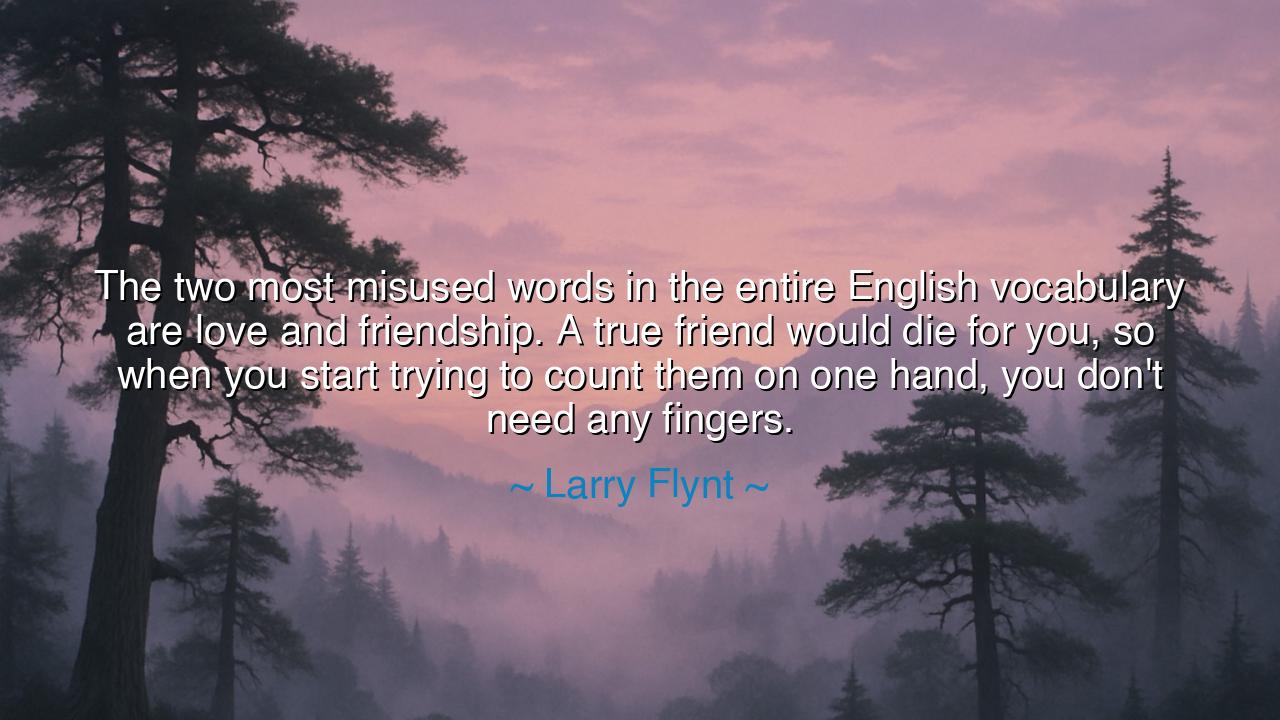
The two most misused words in the entire English vocabulary are
The two most misused words in the entire English vocabulary are love and friendship. A true friend would die for you, so when you start trying to count them on one hand, you don't need any fingers.






“The two most misused words in the entire English vocabulary are love and friendship. A true friend would die for you, so when you start trying to count them on one hand, you don't need any fingers.” Thus spoke Larry Flynt, a man known more for controversy than contemplation, yet whose words here strike with the gravity of ancient truth. Beneath his blunt phrasing lies a timeless reflection: that both love and friendship—sacred, powerful forces—have been cheapened by careless use and hollow imitation. What once were sacred vows of the heart have become conveniences of speech. Flynt, like a prophet in an age of noise, reminds us that true friendship is not abundant, nor casual, nor easy. It is a rare covenant of loyalty so pure that few ever truly experience it, and fewer still are worthy of it.
The origin of these words is rooted in Flynt’s own turbulent life, a life marked by fame, scandal, betrayal, and resilience. As the founder of Hustler, he lived in a world of excess and controversy, surrounded by those who courted his wealth or feared his power. In such a world, where every handshake might conceal a dagger, trust became a luxury, and friendship a near impossibility. His reflection, then, is born not of philosophy but of experience—of learning, perhaps painfully, how rare it is to find another soul who stands with you when the world turns against you. To Flynt, friendship was not measured by smiles or shared pleasures, but by sacrifice—by the willingness to die for another, to give everything without calculation or expectation.
In his statement, Flynt points to the tragedy of language emptied of meaning. The words “love” and “friendship” are spoken freely, carelessly, as if they were common coins. Lovers proclaim eternal devotion, friends pledge loyalty, yet when the storms of life arrive, how many stand firm? To misuse a word is to dishonor its power. And when the words that bind hearts and souls lose their weight, human bonds themselves begin to decay. To Flynt, the misuse of these words is not merely linguistic—it is moral. It is the symptom of a world that has forgotten the cost of true loyalty, the depth of real devotion.
In this, his insight mirrors that of the ancients. The Romans held that friendship—amicitia—was the highest virtue, reserved for the noble and the steadfast. Cicero, in his dialogue De Amicitia, wrote that “friendship can only exist between good men,” for it requires honesty, integrity, and selflessness. When two men shared true friendship, it was as if their souls were joined; each was willing to die for the other. Consider the story of Damon and Pythias, whose bond became legend. When Pythias was condemned to die, Damon offered himself as hostage until his friend could settle his affairs. The tyrant mocked their loyalty, certain it would fail—but Pythias returned, choosing death rather than dishonor, and Damon stood beside him, ready to share his fate. So moved was the ruler that he spared them both. Their story endures because it captures what Flynt meant: that a true friend would die for you—not in word, but in deed.
Flynt’s remark also carries the weight of sorrow, for it acknowledges how few such friendships exist. “When you start trying to count them on one hand,” he says, “you don’t need any fingers.” It is a bitter truth, yet one that should not dishearten us—it should awaken us. It teaches that true friendship is not found among the many, but among the few—or perhaps only once in a lifetime. To call someone a friend is not to label them, but to honor them. And to be a friend, in the truest sense, is to take on a sacred duty: to guard another’s soul as one would guard one’s own, to offer truth when lies are easier, and to remain steadfast when all others falter.
Yet, though rare, such friendship—when found—is a treasure beyond all measure. History remembers not only the great rulers or conquerors, but the friendships that shaped them: David and Jonathan, bound by covenant even as kingdoms clashed; Alexander and Hephaestion, whose bond was said to be “one soul in two bodies.” These friendships endured not because they were easy, but because they were honest. They were love without disguise, loyalty without strategy, trust without fear. And in them, we see reflected the divine truth that the human heart, though fragile, is capable of an immortal bond.
Let this, then, be the lesson: guard your words as you would your honor. Do not speak of love or friendship lightly, for they are the holiest of human promises. Seek not many companions, but one or two whose hearts are tested by time and trial. Be to them what you would wish them to be for you—faithful, truthful, unshaken. Do not measure friendship by laughter or leisure, but by loyalty in hardship. And when you find one who would stand with you through ruin or death, know that you have found something greater than wealth, greater even than love itself.
For as Larry Flynt teaches, the truest friendships cannot be counted on fingers, nor measured in words. They are written instead in deeds—silent, steadfast, and enduring. In a world that speaks too much and loves too little, may we learn once more the sacred weight of those two ancient words: love and friendship. To speak them truthfully is to live honorably; to embody them is to touch eternity.






AAdministratorAdministrator
Welcome, honored guests. Please leave a comment, we will respond soon